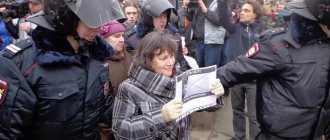ST 141 of the Criminal Code of the Russian Federation.
1. Obstructing the free exercise by a citizen of his electoral rights or the right to participate in a referendum, national vote, violating the secrecy of voting, as well as obstructing the work of election commissions, referendum commissions or the activities of a member of an election commission, referendum commission related to the performance of his duties, -
shall be punishable by a fine in the amount of up to eighty thousand rubles, or in the amount of the wages or other income of the convicted person for a period of up to six months, or by compulsory labor for a term of up to three hundred sixty hours, or by corrective labor for a term of up to one year.
2. The same acts:
a) connected with bribery, deception, coercion, use of violence or the threat of its use;
b) committed by a person using his official position;
c) committed by a group of persons by prior conspiracy or by an organized group, -
shall be punishable by a fine in the amount of one hundred thousand to three hundred thousand rubles, or in the amount of the wages or other income of the convicted person for a period of one to two years, or by compulsory labor for a term of up to four hundred eighty hours, or by corrective labor for a term of up to two years, or by forced labor. labor for a term of up to five years, or arrest for a term of up to six months, or imprisonment for a term of up to five years.
3. Interference, through the use of official or official position, in the exercise by an election commission, referendum commission of its powers established by the legislation on elections and referendums, in order to influence its decisions, namely, a requirement or instruction of an official on the issues of registration of candidates, lists of candidates, vote counting voters, referendum participants, participants in the all-Russian vote and on other issues falling within the exclusive competence of the election commission, referendum commission, as well as unlawful interference in the work of the State Automated System of the Russian Federation “Elections” -
shall be punishable by a fine in the amount of two hundred thousand to five hundred thousand rubles, or in the amount of the wages or other income of the convicted person for a period of one to three years, or by forced labor for a term of up to four years, or by imprisonment for a term of up to four years with a fine in the amount of up to eighty thousand rubles or in the amount of wages or other income of the convicted person for a period of up to six months or without it.
Commentary to Art. 141 Criminal Code
1. The objective side (part 1) is characterized by alternatively provided actions.
Obstruction by a citizen of the free exercise of his voting rights or the right to participate in a referendum can be expressed in illegal obstruction of the exercise of both active (for example, refusal to include a citizen in electoral lists, referendum lists, refusal to issue an absentee certificate, etc.) and passive electoral rights or the right to participate in a referendum (for example, refusal to accept documents for nominating a candidate, cancellation of candidate registration, etc.).
Violation of the secrecy of voting should be understood as control or the possibility of control over the will of a citizen (for example, the absence of voting booths, numbering of ballots, etc.).
Obstruction of the activities of a member of an election commission or a referendum commission related to the performance of his duties may occur in relation to a member of the relevant commission with both a casting and an advisory vote.
2. Part 3 provides for liability for interference, through the use of official or official position, in the exercise by an election commission or referendum commission of its powers established by the legislation on elections and referendums. An exhaustive list of actions recognized as such interference is indicated in the article; and for unlawful interference in the work of the State Automated System of the Russian Federation “Elections”.
Objective side
An act, the specifics of which are enshrined in the provisions of Article 141 of the Criminal Code of the Russian Federation, has several ways of manifestation in the external environment. Obstruction of the exercise of electoral rights includes several actions that will form part of this crime. Moreover, it is important to note that optional features can play a role only in the case of determining time.
So, what will be the objective side of the act provided for in Art. 141 of the Criminal Code of the Russian Federation? This includes not only the creation of obstacles for citizens in matters of electoral law, but also the violation of the secrecy of voting, the work of the commission and its members, that is, everything that is related to the implementation of the right in question.
A mandatory feature is the type of crime. In this case, it is defined as formal, that is, the onset of negative consequences and their connection with the act itself do not matter; it is enough to start performing one of the actions listed above, and criminal prosecution will not take long.
Second commentary to Art. 141 of the Criminal Code of the Russian Federation
1. The object of the crime is the right of citizens of the Russian Federation to elect and be elected to government bodies and local government bodies, as well as to participate in a referendum, guaranteed by Part 2 of Art. 32 of the Constitution of the Russian Federation.
2. The objective side of this crime is expressed in a variety of the following actions (inactions): a) preventing a citizen from freely exercising his voting rights or the right to participate in a referendum; b) violation of the secrecy of voting; c) obstructing the work of election commissions, commissions for holding a referendum (the content of electoral rights and the procedure for organizing elections and holding a referendum are determined in a number of federal laws of the Russian Federation); d) obstructing the activities of a member of an election commission, a referendum commission related to the performance of his duties.
The crime is considered completed from the moment of commission of the provisions specified in the disposition of Part 1 of Art. 141 of the Criminal Code of actions (inaction) regardless of the occurrence of the consequences to which they were aimed.
3. The subject of a crime under Part 1 of Art. 141 of the Criminal Code is a private person who has reached the age of 16 years.
4. The subjective side of this crime (including in aggravating circumstances provided for in Part 2 of Article 141 of the Criminal Code) is characterized by direct intent.
5. Part two of this article provides for liability for this crime committed under the aggravating circumstances specified in it. In this case, bribery as a method of obstruction may consist in the transfer or promise to transfer money or other valuables, or the promise to provide other property benefits; deception - in misleading citizens of the Russian Federation regarding the place and time of voting, the procedure for filling out a ballot, information about candidates, etc.; violence is understood as any physical influence that interferes with the work of election commissions or referendum commissions, and threat is understood as mental influence that can interfere with the exercise of the right to vote or participation in the work of these commissions. This is a threat of violence against the person of the victim or his relatives.
The concept of using one’s official position should be interpreted based on the notes to Art. 201 and 285 of the Criminal Code.
The concept of committing by a group of persons by prior conspiracy or by an organized group is given in Part 2 and Part 3 of Art. 35 of the Criminal Code.
6. Part 3 of the article in question of the Criminal Code of the Russian Federation provides for liability for interference using the subject’s official or official position.
Corpus delicti. An object
Creating obstacles to the exercise of voting rights is an act that encroaches on very important and even specific relationships in society. All interests and freedoms of citizens are established by the Constitution of the Russian Federation. The provisions of Article 141 of the Criminal Code of the Russian Federation protect these areas. Accordingly, the object of the crime is determined precisely in accordance with the basic law of the state.
So, what does the subject of the crime encroach on when he interferes with the exercise of the right to vote? The object is social relations that are formed in the process of realizing all constitutional interests and freedoms. That is, these are rights enshrined in the fundamental law and are the basis for everything in the functioning of society. An additional object is usually not defined in this crime.
Subjective side
What is wine? This is the mental and psychological attitude of the subject of the act to what he did and to the consequences that occurred as a result. It is this that determines the subjective side and is a mandatory feature. No guilt - no crime. Also in some cases, motives and goals play a role, acting as optional features.
Guilt, as is known, has two forms of manifestation: intent and negligence, which, in turn, are divided into subtypes. In the case of Article 141 of the Criminal Code of the Russian Federation, the subject always carries out actions with direct intent. That is, he realizes that he is preventing another person from exercising his right to vote and wants any negative consequences to occur, knowing that they must certainly occur.
Commentary on Article 141
1. In Part 2 of Art. Article 32 of the Constitution of the Russian Federation states that citizens have the right to elect and be elected to bodies of state power and local self-government, as well as to participate in a referendum. Norm Art. 141 of the Criminal Code is one of the guarantees of the exercise of citizens' electoral rights. There was a similar rule in the Criminal Code of the RSFSR, which spoke about liability for obstructing the free exercise by a citizen of the right to elect and be elected as a deputy or President of the RSFSR, or to conduct election campaigning, if these actions were committed with the use of violence, deception, threats or bribery (Article 132). A comparison of the named articles of the new and previous Criminal Code raises the question of whether Art. 141 of the Criminal Code means liability for violation of the right to be elected to bodies of state power and local self-government, or liability is provided only for violation of the right to vote, since the right to be elected is not directly mentioned, as was the case in the Criminal Code of the RSFSR. It seems that what is used in Art. 141 of the Criminal Code, the concept of “suffrage rights” as a broader concept covers both the right to vote and the right to be elected. This approach follows, in our opinion, from Art. 32 of the Constitution of the Russian Federation. It is difficult to imagine that the new Criminal Code intends to narrow the criminal legal protection of citizens’ voting rights in both of their manifestations. In this regard, we clarify our position, which was expressed earlier (see New criminal law of Russia. Special part. M., 1996, pp. 77 - 78).
In Part 1 of Art. 141 of the Criminal Code establishes liability for obstructing the work of election commissions and referendum commissions. The Criminal Code of the RSFSR did not provide for such liability.
In addition, in Art. 141 of the Criminal Code, Part Two is highlighted, where the most dangerous methods and circumstances of committing this crime are classified as qualifying criteria. In the Criminal Code of the RSFSR, with some differences in these types of methods and circumstances, they were listed in one article as a characteristic of the objective side of the crime.
2. In Art. 141 of the Criminal Code, we are actually talking about three crimes: 1) obstructing a citizen from exercising his electoral rights (obstructing participation in voting and obstructing the exercise of the right to be elected to bodies of state power and local self-government); 2) preventing a citizen from exercising the right to participate in a referendum; 3) obstructing the work of election commissions.
Obstruction of participation in voting may consist of direct refusal or other illegal actions aimed at creating obstacles to familiarization with voter lists, filing an application for inclusion in voter lists, receiving an absentee certificate when changing location on election day, appearing at a polling station, receiving a ballot for voting, etc.
Similar illegal actions may be an obstacle to a citizen’s participation in a referendum.
Obstruction of the exercise of the right to be elected to bodies of state power and local self-government may consist, for example, in the illegal refusal to register a citizen as a candidate for deputy of the State or Regional Duma or local government; in creating obstacles for the candidate himself or his proxies to conduct free campaigning; illegally refusing a candidate to speak in the media.
Obstruction of the work of election commissions may consist of obstructing the work of members of an election commission at a polling station or an election commission at a higher level. Obstacles may include depriving members of the election commission of the opportunity to work as part of it, depriving observers of the opportunity to be present during voting or vote counting, committing administrative offenses or crimes that violate public order, etc.
3. Crimes provided for in Art. 141 of the Criminal Code are considered completed from the moment the actions specified therein are performed, regardless of whether the consequences they were aimed at achieving have occurred.
4. The subject of a crime can be a person over 16 years of age.
5. Bribery is the provision of any property benefits to a candidate for deputy, for example, for withdrawing his candidacy, as well as to a citizen for non-participation in elections or a referendum, or to a member of the election commission for non-participation in the work of the election commission, or to any person for obstructing the work of the election commission.
6. Deception can be active - reporting false information or passive - keeping silent about the truth and can relate to various factual circumstances, in particular, the identity of the candidate, his party affiliation, the place and time of the elections, the possibility of a terrorist attack on the premises of the election commission, etc.
7. Violence means physical violence, both dangerous and not dangerous to the life or health of the victim, including causing minor harm to health.
8. The threat of violence is the intimidation of the victim by the use of physical violence against him. It must be real. The moment of its intended implementation can be either the present or the future.
9. The commission of an act by a person using his official position is a qualifying attribute similar in content to the attribute of the same name provided for in Part 2 of Art. 136 of the Criminal Code (see also commentary to Articles 201 and 285 of the Criminal Code).
10. This crime is recognized as committed by prior conspiracy by a group of persons or an organized group when at least two persons took part in it, having previously, i.e., before committing the crime, agreed to commit it jointly or constitute a group organized to commit this crime, or other crimes (see commentary to Article 35 of the Criminal Code).
Scientific and practical commentary:
1. Article 32 of the Constitution of the Russian Federation guarantees citizens of the Russian Federation the right to elect and be elected to government bodies and local government bodies, as well as to participate in a referendum.
The voting rights of citizens and the operating procedures of election commissions are determined by federal laws. 2. The objective side of the crime includes actions that violate the electoral rights of citizens and the work of election commissions: a) preventing a citizen from freely exercising his electoral rights and rights to participate in a referendum (non-inclusion, refusal to include a person in the voter list, refusal to a voter to familiarize himself with the lists voters, obstruction of the nomination of a candidate, election campaigning, observation of elections and the work of election commissions, including the establishment of voting results and determination of election results), as well as obstruction of other electoral actions in the manner established by federal election legislation; b) violation of the secrecy of voting (interference with filling out a ballot or questionnaire, admission of other persons into a voting booth or room while a voter or person participating in a referendum is there, failure to fulfill the obligation to take measures to specially equip voting places); c) obstructing the work of election commissions and referendum commissions (actions that deprive or limit the ability of commissions to carry out activities within the framework of their powers). A crime can also be committed through inaction, i.e. failure of bodies, institutions, their officials, as well as organizations to fulfill the duties assigned to them by federal legislation to assist election commissions and referendum commissions in the exercise of their powers. 3. The crime has a formal composition and is considered completed from the moment the actions (inaction) specified in the law are committed. 4. The subjective side is characterized by direct intent. The content of the motive and purpose of violating the electoral rights of citizens does not affect the qualification of the crime. Acts provided for in Art. 141 of the Criminal Code, committed on grounds of discrimination must be qualified under Art. Art. 141 and 136 of the Criminal Code. 5. The subject of the crime is a person who has reached the age of 16 years. 6. Qualifying criteria (Part 2 of Article 141) are: bribery, deception, coercion, use of violence, threat of violence, use of official position and the commission of acts specified in Parts 1 and 2 of the commented article, by a group of persons on preliminary conspiracy and organized group. For signs of bribery, see commentary to Art. 309. Deception - misrepresentation, provision of false information about candidates, the procedure and timing of the election campaign and elections, as well as providing voters with false information when exercising their voting rights. Deception also means the deliberate concealment of information that ensures the transparency of elections and referendums, as well as the full awareness of their participants. For signs of coercion, see commentary to Art. 302. Violence - beatings, causing minor or moderate harm to health, as well as committing other violent acts that interfere with the free expression of the will of voters and the exercise by election commissions and referendum commissions of their powers. The use of official position should be interpreted based on the content of the notes to Art. Art. 201 and 285 of the Criminal Code. The commission of this crime by a group of persons by prior conspiracy or by an organized group is qualified taking into account the provisions of Parts 2 and 3 of Art. 35 of the Criminal Code. 7. In part 3 of Art. 141 provides for liability for interference, through the use of official or official position, in the exercise by an election commission or referendum commission of its powers established by the legislation of the Russian Federation. Methods of interference, as well as issues, interference in the resolution of which using official or official position is punishable under Art. 141, are specified in detail in the law.
Subject of the crime
A branch such as criminal law establishes general criteria for determining the subject of a socially dangerous act. These include sanity, which is defined as the ability to fully understand actions and, of course, direct them, age, which varies depending on the type of crime and its severity. And of course, the subject is always an individual; a legal entity can only be a victim.
So, what is the subject of the crime provided for in Article 141 of the Criminal Code of the Russian Federation? Comments to it indicate that an act that implies a violation of constitutional law has common criteria. A subject is an individual who has already reached the age of sixteen. Sanity is a mandatory condition and applies to every case.
Part three of the article under consideration fixes a special subject. It says that this act is committed using an official or official position. Qualification under this part of the article is possible only in the case when interference in the work of the election commission is carried out by a citizen who abuses his special powers.



